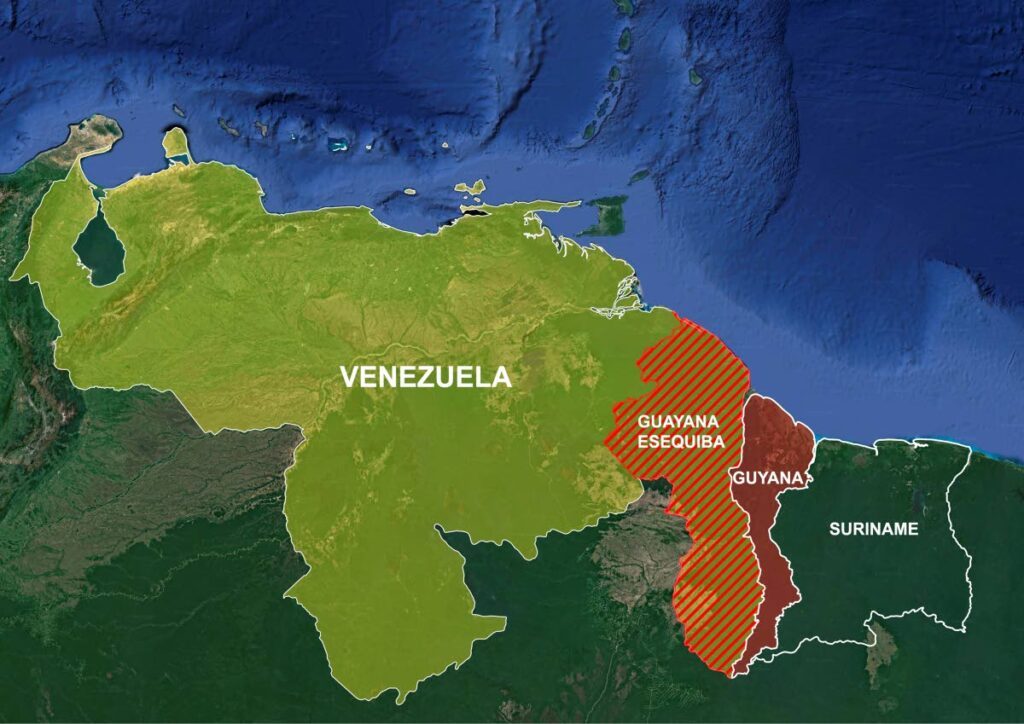Tensions rise over Essequibo

VENEZUELAN President Nicolas Maduro on Tuesday raised tensions over Guyana’s oil-rich Essequibo region by declaring it to be a part of Venezuela.
He issued a map portraying the Essequibo as part of an enlarged Venezuela, named a purported military governor of the area, ordered Venezuelan companies to undertake and administer oil exploration, and promised a census of the local population who would all be issued Venezuelan ID cards.
The drastic moves came mere days after last Sunday’s referendum in which the Venezuelan Government claimed ten million voters (out of a 20 million electorate) almost completely supporting Venezuela’s claim to the Essequibo and rejection of the remit of the International Court of Justice (ICJ) in this dispute.
Maduro’s move defied the ICJ’s ruling last Friday that Venezuela refrain from any action in its claim over Guyana’s Essequibo region and warned against any aggravation of the dispute.
Retired head of the Institute of International Relations, UWI, St Augustine Dr Anthony Gonzales said Maduro’s remarks had escalated the situation and hinted at an intended entry to Essequibo.
“I don’t see how he can do all these things he’s saying without occupying the Essequibo,” said Gonzales, otherwise adopting a wait-and-see position.
After Maduro’s call for a law to establish Guayana Esequiba as a part of Venezuela, Telesur said on Wednesday the Venezuelan National Assembly had met and approved the bill, with assembly president Jorge Rodríguez saying the bill would be fully prepared within a week.
Guyana's President Dr Irfaan Ali on Wednesday said he had spoken to UN general secretary António Guterres and was asking the UN Security Council to intervene.
In a Facebook post on Wednesday he said Guyana would intensify measures to safeguard its territory.
“This is a direct threat to Guyana’s territorial integrity, sovereignty and political independence,” he said of Maduro’s remarks.
Ali also gave interviews to top media houses, including the BBC.
“I am concerned that Venezuela can indeed follow up the rhetoric and the narrative and act in a reckless manner. This is concerning because, already we have a dangerous situation in Venezuela, where the people are suffering as a result of the type of governance.
“As a country, we are not taking this for granted. We are not taking the narrative out of Venezuela for granted. That is why we have been working with our neighbours, friends, Caricom, the Commonwealth, the OAS. They have all issued very strong statements and called on Venezuela to respect the rule of law and the order of the ICJ.”
Newsday was unable to get a response from the Prime Minister up to press time, nor comments from National Security Minister Fitzgerald Hinds regarding regional security.
However Minister of Foreign and Caricom Affairs Dr Amery Browne, via WhatsApp, told Newsday Caricom leaders would discuss the matter virtually on Friday.
“I have received updates and exchanged information with Guyana and with Venezuela in the aftermath of the December 3 referendum, and remain in constant contact with the foreign minister of Guyana, with our team in Caracas, and Venezuela’s Ambassador to Port of Spain, with all Caricom counterparts and with key external partners,” he related.
Browne said “Caricom speaks with one voice” on the issue, and that voice, as always, fully included TT. “We continue to clearly call for respect for international law and the jurisdiction of the International Court of Justice, for peace to be maintained and preserved, and for full respect for the territorial integrity of Guyana and all member states.”
Newsday received a statement by a US Embassy spokesman urging a peaceful resolution.
“The 1899 arbitral award determined the land boundary between Venezuela and Guyana and should be respected unless, or until, the parties reach a new agreement, or a competent legal body decides otherwise.
“The US urges Venezuela and Guyana to continue to seek a peaceful resolution of their dispute, including by the International Court of Justice.”
On Wednesday, the foreign ministers of Guyana (Hugh Hilton Todd) and Venezuela (Yvan Gill) held a phone conversation, said statements from each country.
Each country claimed the talks were at the behest of the other side.
Guyana’s Ministry of Foreign Affairs and International Co-operation – in a statement titled Guyana reiterates need for respect for territorial integrity – said the ministers’ phone call was initiated by the Ambassador of Venezuela to Guyana, Carlos Amador Perez Silva.
Todd complained actions by Caracas in the past 24 hours had directly violated the ICJ’s order. Reiterating Guyana’s commitment to resolution via the ongoing judicial process, he encouraged Venezuela to participate in the court case. Pledging respect for international law and the need for peace and security in the region, Todd encouraged respect for Guyana’s respect and territorial integrity.
The Venezuelan Government, in a communiqué, said the talks were held “at the request of the Guyanese side.”
“The Venezuelan side took the opportunity to update the Government of Guyana on the overwhelming participation in the popular consultation, which resulted in an unappealable mandate for the Venezuelan institutions on the route to follow for the settlement of this territorial controversy, which is the Geneva Agreement signed between the parties in 1966.
“The Venezuelan side expressed the need to stop the actions of aggravation of the controversy in the territory of the Guayana Esequiba and agreed to keep the channels of communication open.”


Comments
"Tensions rise over Essequibo"